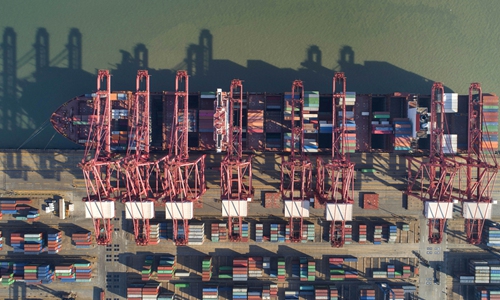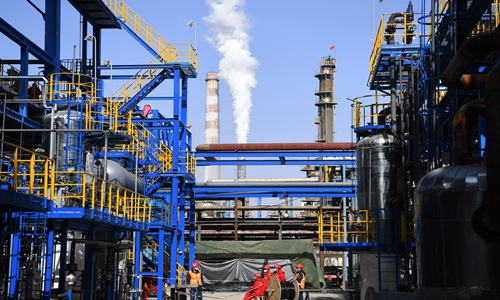HOME >> SOURCE
Indicators drop to record low amid epidemic
By Li Xuanmin and Ma jingjing Source:Global Times Published: 2020/3/16 23:38:40
Nation endures maximum pressure test amid epidemic

Workers load containers onto a ship in Lianyungang Port in Jiangsu East China's Jiangsu Province on Sunday. Photo: cnsphoto
China's major economic indicators, including retail sales, industrial output and fixed-asset investment, posted double-digit contractions from January to February, as factories were shut down for prolonged periods and consumers were forced to stay home and cut spending amid the nation's top-down efforts to fight the outbreak of coronavirus.
Some estimated that China's GDP could drop by up to 30 percent in the first two months and post zero or even a negative growth in the first quarter. Although more factories are humming and ports are bustling - signs of robust economic rebound - China could potentially suffer a second economic shock as COVID-19 moves rapidly overseas, casting a shadow on global economic prospects, industry insiders said.
In the first two months of 2020, growth of retail sales slumped 20.5 percent year-on-year to 5.2 trillion yuan ($744 billion), the lowest in history, while national fixed-asset investment growth slid 24.5 percent year-on-year to 3.33 trillion yuan for the two months, also the lowest in history, the National Bureau of Statistics (NBS) said on Monday.
Another important economic indicator, value-added industrial output, dropped 13.5 percent. It marked the first contraction since January 1990, when industrial production shrank 21.1 percent.
Chinese observers said such slumps are within anticipations, and mirror the massive economic cost of an effective "war of annihilation" against COVID-19.
"The data provided an objective picture on how the Chinese economy could be hammered in the short term due to a 'black swan' event," Tian Yun, vice director of the Beijing Economic Operation Association, told the Global Times on Monday.
Based on the indictors, some economists forecast that China's GDP could dive up to 30 percent in the first two months.
Looking ahead, macroeconomic data in March will very likely outperform the previous month but is far from achieving pre-virus normalcy as the number of confirmed cases rise rapidly overseas, denting global economic outlook, Wang Jun, chief economist at Zhongyuan Bank Co, told the Global Times on Monday.
That means China's economy may touch a historic low of zero or even negative growth in the first quarter, analysts said. NBS spokesperson Mao Shengyong said at a press briefing on Monday that the March economy will contribute 40 percent to China's Q1 GDP, while that of January to February contributed 60 percent.
"We sacrifice two months of economic interests for epidemic prevention. The impact should be temporary and one-off, but here comes another new challenge," Tian said.
The US Federal Reserve slashed interest rates by 1 percent to a range of 0-0.25 percent on Sunday to inject liquidity in the market.
The unexpected move, coupled with interest rate cuts by a number of central banks, fueled global panic that to what extent the virus is triggering a worldwide economic meltdown and in China, whether virus outside will slow down a growth momentum at home.
Hua Changchun, chief economist at Guotai Junan Securities, told the Global Times on Monday that China needs to make preparations for a second economic shock brought about by an overseas outbreak.
"It's beyond our expectations as to how long the coronavirus will last and spread outside China. If other countries are mired in a protracted fight against the virus, China's domestic and overseas demand will unavoidably slump in a longer period," Hua said, noting that China's economic downward pressure will become stronger.
Calls for more policy support
Some analysts described the outbreak as a margin pressure test on Chinese economy which the nation has managed to navigate through.
"We have not been crushed. I don't think any other major economy in the world - neither the US nor the EU - could withstand such a test. The meaning behind the numbers is significant," Tian stressed, pointing to the resilience of Chinese economy.
Regardless of how external situations change, observers held that stabilizing domestic consumption should be the priority of Chinese policymakers.
"China's answers to the virus are to contain the epidemic first, then support companies to resume production and stabilize the economy with a number of stimuli. We should stay with the maneuver," Tian said.

Photo: cnsphoto
Mao noted that China will ramp up macroeconomic policies and appropriately raise the country's fiscal deficit ratio to cushion the negative effect of the coronavirus outbreak and external challenges. But he stressed that China will not resort to a "flood-style" stimulus and its monetary policy will focus on targeted support.Ren Zeping, chief economist of the Guangzhou-based Evergrande Group, said in a note that China will embark on a new growth momentum as long as policymakers promote active fiscal policies to reduce taxes and boost "new infrastructure" construction, and commit to opening-up and building a multi-layer capital market.
In a bid to boost consumption, a number of Chinese cities, including Nanjing, capital of East China's Jiangsu Province, and Ningbo, East China's Zhejiang Province, have rolled out vouchers worth up to 420 million yuan, media reported.
Revival hopes
While China is walking out of the marsh, most of the other global economies are running desperately in their battle with the virus.
For example, Ren noted that the' recent US massive interest rate and quantitative easing (QE), a strategy Washington took in coping with 2008 financial crisis, was more like "drinking poison to quench thirst."
"The US skipped the first step [of curbing the virus] and jumps directly to the second stage. This is wrong. You cannot achieve the two tasks at the same time," Ren said.
Cong Yi, a professor at the Tianjin University of Finance and Economics, also highlighted looming risks in the US economy, including a stock bubble, mounting leverage ratio and widening wealth gap, which could burst if COVID-19 is not swiftly controlled in the country. It may even drag the economy into recession.
Tian predicted that the impact of the virus on the US economy will be much longer and more severe than on Chinese economy due to the lack of sweeping measures from US politicians.
The blow on South Korea and Japan is also fatal, as the two countries are export-oriented economies - unlike the Chinese economy, which is partly underpinned by domestic consumption, Cong told the Global Times.
In 2019, China contributed 30 percent to global economic growth, NBS said.
Posted in: INDUSTRIES,ECONOMY